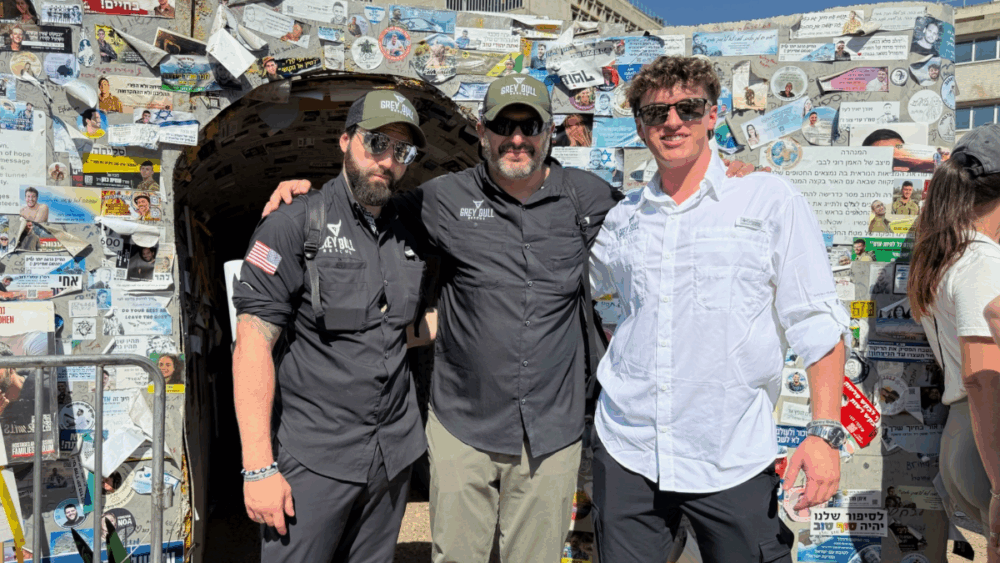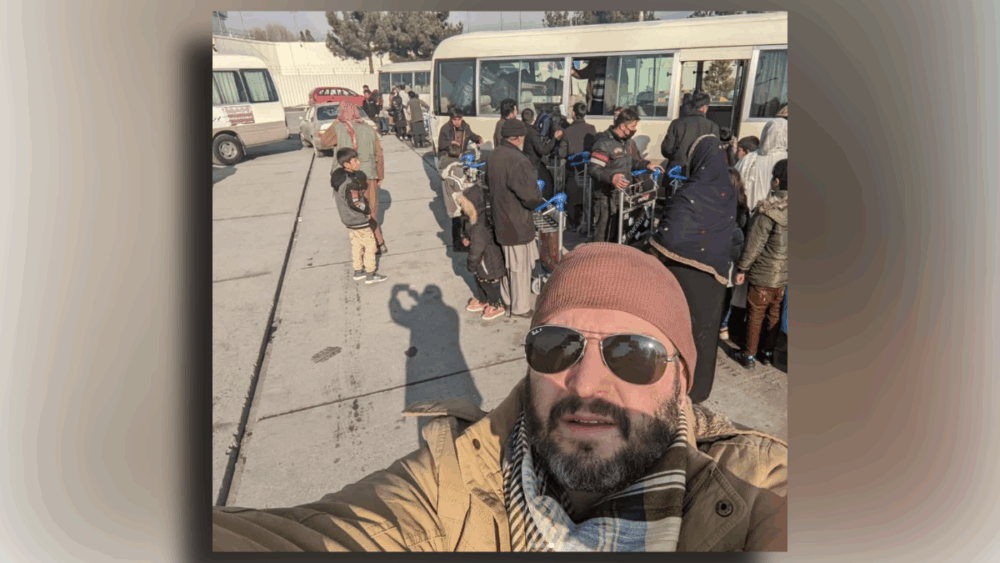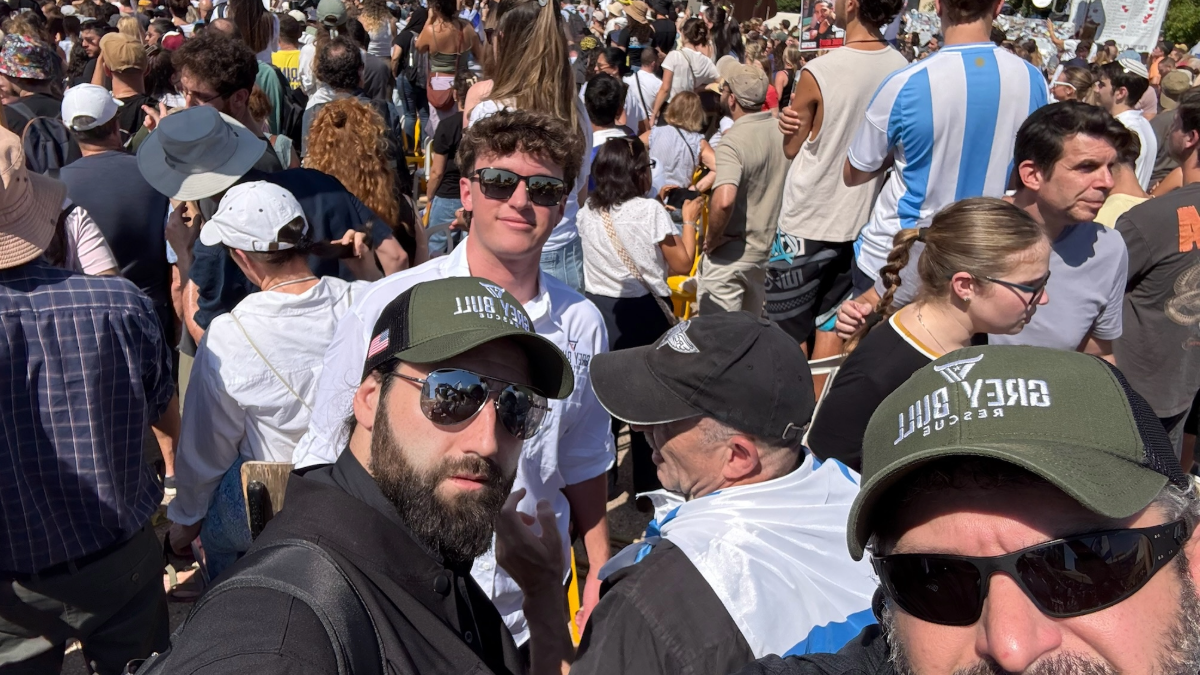For 737 days, families gathered in Hostages Square to cry, pray and plead for the return of their loved ones. The plaza, once a place for community art and speeches, became a vigil site where grief lingered day after day.
When the hostages were finally released, Bryan Stern, founder of Tampa-based Grey Bull Rescue, stood among the crowd.
“We were at Hostages Square all day,” Stern told TBBW, from Israel. “For 737 days, families gathered, prayed and wrote messages. They shook their fists at the government, at officials, at bad guys, at everyone. And today there were smiles everywhere.”
He described the moment as one of collective relief.
“Hostages Square has always been this very somber, fearful place, filled with all of the negative emotions that we’re capable of,” he said. Today, there were smiles everywhere. There were happy tears. The nightmare for all these families is finally over.”
 Grey Bull Rescue founder Bryan Stern, center, with team members in front of the tribute wall at Hostages Square in Tel Aviv, where families have posted photos and messages for loved ones held in Gaza.
Grey Bull Rescue founder Bryan Stern, center, with team members in front of the tribute wall at Hostages Square in Tel Aviv, where families have posted photos and messages for loved ones held in Gaza.
READ: Metro Diner opens first Palm Harbor restaurant – Tampa Bay Business & Wealth
From special operations to rescue missions
Long before he stood in Tel Aviv, Stern built his career in the shadows of military operations. He spent nearly three decades in special operations and intelligence, serving in roles that required precision and secrecy.
“I spent years in the military in special operations and intelligence,” he said. “I trained for missions on the darker side of operations, depending on the assignment. I did that for 27 years.”
After leaving government service, Stern said he wanted to stay connected to the mission but without the bureaucracy.
“I left government full-time to stay in the game a little bit,” he said.
In 2016, he moved to Tampa and founded Grey Bull Rescue, a nonprofit that deploys veterans to evacuate civilians from conflict zones and disaster areas.
“Since August 2021, my team and I have done 796 operations,” Stern said. “That turns to just under 8,000 people in Afghanistan, Ukraine, Russia, Haiti, Lebanon, Syria, Israel and Gaza. We did Hurricane Ian. We did the fires in California and a couple of other disasters.”
 Bryan Stern, founder of Tampa-based Grey Bull Rescue, is pictured during an evacuation mission in Afghanistan in August 2021. The organization was formed after the fall of Kabul and has since led nearly 800 rescue operations across global conflict zones.
Bryan Stern, founder of Tampa-based Grey Bull Rescue, is pictured during an evacuation mission in Afghanistan in August 2021. The organization was formed after the fall of Kabul and has since led nearly 800 rescue operations across global conflict zones.
Among those rescued were Americans held in Russian prisons.
“We’ve done 12 jail breaks for Russia, including the first American victim of war crimes since World War II,” he said. “He’s actually with me here in Israel as we speak.”
An organization built for speed
Grey Bull operates differently from most humanitarian or government-backed groups. It is entirely donor-funded and intentionally small, built for speed and discretion.
“82%of our cases come from social media,” Stern said. “We don’t charge money. We run entirely on donations, big or small. Ultimately, helicopters don’t fly themselves.”
He described Grey Bull as a last-resort rescue team, often contacted only when traditional efforts fail.
READ: Tampa’s Liquor Depot Event Raises $20K for Mike Alstott Foundation
“We are never the first call,” he said. “We’re the last resort. The State Department and FBI have referred families to us. We go where the government isn’t or where they can’t land.”
Without bureaucracy or political barriers, the team can move quickly.
“We have no red tape at all,” Stern said. “We’re able to do things at a speed that the government can’t compete with. We answer to two people: God and the families of the people we’re trying to rescue.”
Life in the line of fire
The work comes with danger.
“We took 32 missiles in one day this past June,” Stern said. “The size of school buses.”
He said his team accepts the risk as part of the job.
“We try to control the environment to manage risk,” he said. “But there’s not much you can do against a missile being lobbed from Iran.”
Stern said he has worked throughout the region, often deep behind enemy lines.
“We were 420 miles into Hezbollah territory earlier this year rescuing an American from Reno, Nevada, and got him out,” he said. “We have a 100% success rate. If we tell you yes, we’ll be there.”
Each mission, he said, is different.
“Each operation is different, sometimes requiring only one or two people,” he said. “We’ve done ops alone or with small teams. A big footprint for us is six. We run very small.”
Stern personally participates in nearly every mission.
“If I’m not on a mission, it’s because I’m doing another mission somewhere else,” he said.
The moment in Hostages Square
Standing in Hostages Square, Stern said the atmosphere felt like both an ending and a beginning.
“For 737 days, families gathered to write, pray and hold signs,” he said. “They shook their fists at bad guys and good guys alike. And today, they finally smiled.”
He called it a “rebirth.”
“There’s this real kind of a rebirth of the people,” he said. “Between soldiers killed in the war, people killed on October 7, or hostage families, every single person in this country is affected without exception.”
READ: Tampa Edition named one of Florida’s top hotels by Condé Nast Traveler
He said the feeling in the square stood in stark contrast to the long wait that came before it.
“This has been a daily topic of conversation for 737 days with no end in sight, up until recently,” he said.
Looking forward
For Stern, the end of the hostage crisis is not an end to his mission, only a reminder of how fragile peace can be.
“I think it’s important that this isn’t over,” he said. “The hostages are over, right? But it’s fragile.”
He said Grey Bull’s operations depend on continued public support.
“We’re entirely donor-funded and need public support,” he said. “Every life we save is tied to donors. If people don’t donate, people die.”
To visit Grey Bull Rescue’s website, click here. To donate, click here.
Stay Connected
Follow TBBW on social media

